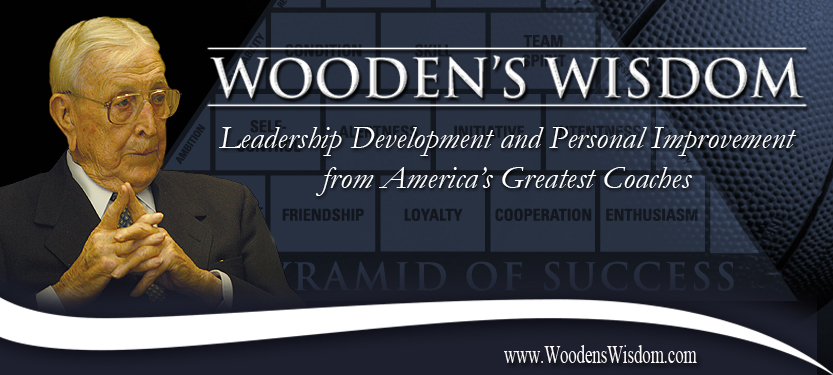 |
|
| Wooden's Wisdom - Volume 1 | Issue 41 |
| Craig Impelman Speaking | Championship Coaches | Champion's Leadership Library Login | |
|
The Coach as a Teacher - Part 3 (When success turns your head, you face failure.) Coach Wooden defined important aspects of the coach as a teacher in the following manner:
He must continuously be exploring for ways to improve himself in order that he may improve others and welcome every person and everything that may be helpful to him. As has been said, he must remember, "Others, too, have brains."
Coach then listed criteria that he believed might be helpful to define an effective teacher. His list and applicable maxims are italicized; my commentary follows.
1. Knowledge of your subject.
It's what you learn after you know it all that counts.
Coach gained his knowledge of basketball from his experience as a player and the wisdom of his coaches (Earl Warner, Glenn Curtiss and Piggy Lambert). As a college player he interviewed opposing coaches to gain insight into their strategies. As a high school coach he attended Frank Leahy's Notre Dame Football practices and learned time management. After every season he sent out his research survey on a particular basketball topic to coaches who were outstanding in that field. Through the end of his career he attended every coaching clinic he could; always with an open mind, wanting to learn more. Although many considered him a "subject matter expert" he constantly sought more knowledge.
2. General knowledge.
Learn as if you were going to live forever, live as if you were to die tomorrow.
Coach took several classes in psychology as he thought it would help him become a better teacher. He was an avid reader on a variety of subjects. The numerous books that he read about Mother Theresa and Abraham Lincoln helped him formulate his philosophy of life which he shared with his students. Coach truly had intellectual balance.
3. Teaching skill.
You get ideas across better through listening and a pat- on- the - back method than you do with a kick in the pants.
Coach firmly believed that a great teacher always learns from his students.
4. Professional attitude.
Learn to disagree without being disagreeable.
There is likely to be conflict in any work environment. Working through these situations with an open mind, calmness and reason is the mark of a true professional.
5. Discipline.
You cannot antagonize and be a positive influence and you will antagonize when you discipline through emotion.
Discipline is required in any learning environment. It is helpful to remember that the purpose of discipline is to teach, not to punish.
6. Classroom (floor) organization.
There is no substitute for hard work and careful planning.
Coach spent two hours daily planning each two and a half-hour practice.
7. School and community relations.
The happiest moments in life come from making someone else happy.
Coach was an eager volunteer in community and school activities. He viewed it as his responsibility and truly enjoyed helping others.
8. Teacher – pupil (coach – player) relationship.
Our youth need examples more than critics.
When we set a great example, instruct with reason, not criticism and listen, we're likely to have a productive relationship.
9. Warmer personality and genuine consideration for others.
Be more concerned with loving than been loved, giving than receiving, being a friend rather than having a friend.
10. Desire to improve.
When success turns your head, you face failure.
The constant effort to improve, even when others view us as successful, is the trademark of a truly great teacher.
Yours in coaching,
Craig Impelman www.woodenswisdom.com
Twitter: @woodenswisdom
|
THE TEN COMMANDMENTS OF HUMAN RELATIONS
1. Speak to people. There is nothing
as nice as a cheerful
word of greeting.
2. Smile at people. It takes 72 musclesto frown and
only 14 to smile.
3. Call people by name. The
sweetest musicto anyone is the
sound of one's own name.
4. Be friendly and helpful.
If you would
have friends, be friendly.
5. Be genuinely interested in people.
You can like anybody if you try.
6. Be cordial. Speak and act
as thougheverything you do
is a real pleasure.
7. Be generous with praise
and cautious with criticism.
8. Be considerate of the feelings
of others. It will be appreciated.
9. Be thoughtful of the opinion
of others. There are three sides
to a controversy - yours, the
other side and the right one.
10. Be alert to give service.
What counts most in life is
what you do for others.
- Anonymous |
|
For more information visit www.woodenswisdom.com |
|
© Copyright 2026 WoodensWisdom.com | # of Times Wooden's Wisdom Issues Opened: 7,850,297
Hosting & Design by:EverydayWebDesign.com